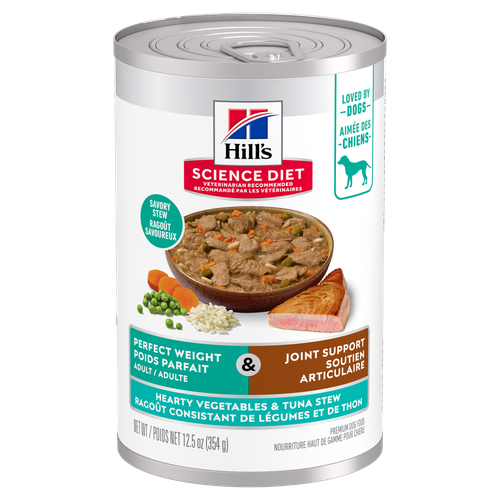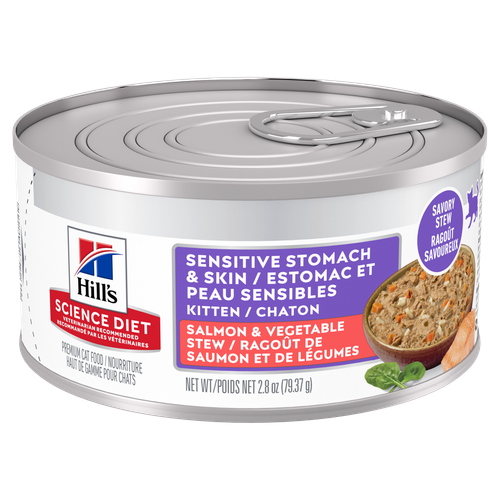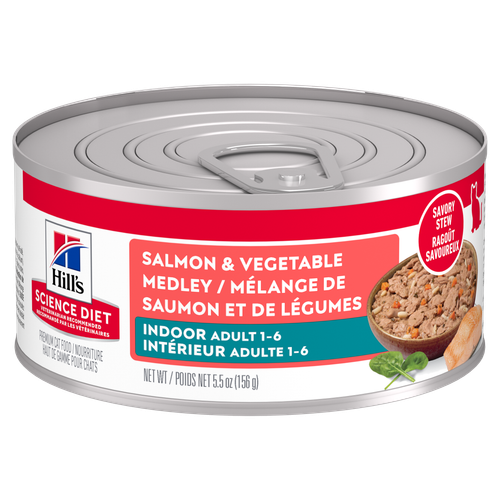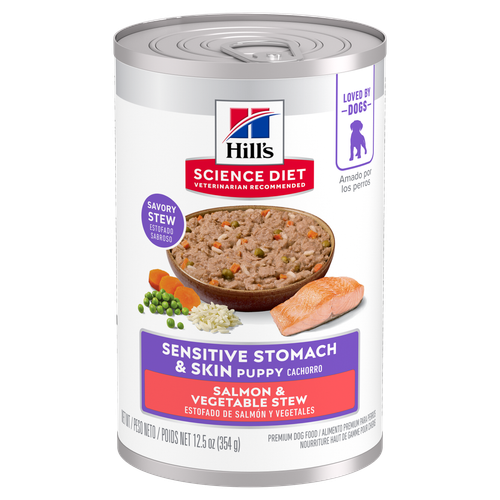
-
Find the right food for your petTake this quiz to see which food may be the best for your furry friend.Find the right food for your petTake this quiz to see which food may be the best for your furry friend.Featured products
 Sensitive Stomach & Skin, assortiment de conserves
Sensitive Stomach & Skin, assortiment de conservesHill's Science Diet Sensitive Stomach & Skin Variety Pack
Shop Now Adult Perfect Weight & Joint Support Hearty Vegetables and Tuna Stew Dog FoodShop Now
Adult Perfect Weight & Joint Support Hearty Vegetables and Tuna Stew Dog FoodShop Now Healthy Cuisine, Adulte, assortiment de conserves
Healthy Cuisine, Adulte, assortiment de conservesHill's Science Diet Healthy Cuisine Variety Pack
Shop NowFeatured products Kitten Sensitive Stomach & Skin Salmon & Vegetable Stew
Kitten Sensitive Stomach & Skin Salmon & Vegetable StewSupports kitten growth, digestive health, nourishes skin and promotes a lustrous fur
Shop Now Adult Indoor Salmon & Vegetable Medley Cat Food
Adult Indoor Salmon & Vegetable Medley Cat FoodPrecisely balanced nutrition for indoor cats with the delicious taste of savory salmon and vegetables
Shop Now Adult Urinary Hairball Control Savory Chicken Entrée cat food
Adult Urinary Hairball Control Savory Chicken Entrée cat foodSupports the health of the whole urinary system with optimal levels of magnesium
Shop Now -
Dog
- Dog Tips & Articles
-
Health Category
- Weight
- Food & Environmental Sensitivities
- Urinary
- Digestive
- Joint
- Kidney
- Dental
- Cancer
-
Life Stage
- Puppy Nutrition
- Adult Nutrition
- Senior Nutrition
Cat- Cat Tips & Articles
-
Health Category
- Weight
- Skin & Food Sensitivities
- Urinary
- Digestive
- Kidney
- Dental
- Stress
- Cancer
-
Life Stage
- Kitten Nutrition
- Adult Nutrition
Featured articles Pet Food Storage Tips
Pet Food Storage TipsDiscover how and where to store your dry, as well as canned, dog and cat food. Learn how to find the "best before" dates on all Hill's pet food packaging.
Read More The Incredible Science Behind Your Pet's Microbiome
The Incredible Science Behind Your Pet's MicrobiomeLearn what a pet's microbiome is, how it contributes to your pet's gut & overall health, and why nutrition is important in maintaining healthy microbiomes.
Read More Compare Your Pet Food's Calories to Other Brands
Compare Your Pet Food's Calories to Other BrandsCompare Hill's Science Diet dog and cat food's calories against other pet food brands and AAFCO recommended maximum calorie count.
Read More -


You caught your dog doing the booty scoot on your favorite rug and now you're wondering why they do it and how you can get it to stop. Whether that or excessive licking of your pet's hind region is what brought you here, it's likely that your dog's anal glands need attention. While that's probably the last part of your dog's anatomy you'd like to pay attention to, the fact is that anal gland problems in dogs are fairly common and often the cause of dog scooting problems.
Your Dog's Anal Glands

Your dog's hind end includes two small sacs located on the inside of their rectum, one on each side within the muscular wall, says The Spruce. These sacs gradually fill with secretions from sebaceous glands — the same glands found at the end of hair follicles that are responsible for unwashed hair becoming greasy — located inside each sac.
The only real function these anal glands are known to serve is in doggy communication: they're what dogs sniff when they say hello to each other. They also excrete scent whenever your dog goes number two, and may make it easier for your pet to pass stools. When they're working properly, these glands are emptied when your dog does their business.
Anal Gland Problems in Dogs
Unfortunately, things don't always function properly. Soft or small stools don't provide enough pressure to empty the sacs. If the glands fill until they become uncomfortable, your beloved pup scoots across the floor to get relief. When this happens, the glands are what's called impacted, says Preventive Vet.
Not only are impacted anal sacs uncomfortable for your pooch, but if ignored they might become infected and abscessed, requiring treatment with antibiotics. If the abscessed glands rupture, they may need surgery to repair, and your dog might also need pain medication to aid their recovery.
Anal Gland Expression
When anal gland problems in dogs begin to develop, human intervention may be required to provide relief. Impacted anal glands need to be manually expressed, a task that can be performed by a veterinarian, or a vet nurse — some dog groomer who's been trained in the tasked may do this as part of the routine grooming, but if you notice an issue, you should always bring your dog to vet over the groomer.
Manually expressing a dog's anal glands typically involves inserting a gloved finger into the rectum to locate the gland and gently squeeze it to empty its contents. If impacted anal glands become a recurrent problem, manual expression might need to be done on a regular basis. You could do this for your dog at home, but it's best to have a professional teach you how before attempting it on your own. A startled or uncomfortable dog could snap or bolt. The ick factor involved in the task might also convince you it's a job best left to the pros.
What Causes Anal Gland Problems in Dogs?

Poor quality bowel movements can contribute to anal glands becoming impacted, says Petfinder. Constipation and diarrhea can produce stool that isn't sufficient for the task of emptying the anal sacs. Hereditary malformations of the anal glands could also be a cause. Preventive Vet adds that chronic skin conditions, including yeast infections, skin or food allergies or infestations of skin mites, may increase a dog's chances of developing chronic anal gland problems.
Other contributing factors include low thyroid function and obesity. And although it's less common, a tumor could be to blame. It's also possible that unnecessary anal gland expression, as is sometimes done routinely by groomers, could create scar tissue that prevents the glands from being able to empty themselves. If this might apply to your dog, talk to your groomer to make sure your pup's glands aren't being unnecessarily expressed on every visit, which could do more harm than good.


Tasty Tips
Signs of Impacted or Infected Anal Glands
While dog scooting could be one possible symptom of anal gland problems, this behavior could have other causes, such as parasites or digestive problems. Or, it could simply be an itchy butt. Typically, a dog with impacted anal glands will scoot more than once or twice, and can also usually be seen licking their rear end. Redness or swelling around the sphincter is an indication that the glands are becoming infected, as is blood or puss in your dog's stool or left behind on the carpet after they've finished scooting.
When to See a Vet
If you suspect your dog may have impacted anal glands, talk to your vet to see if your dog should be brought in. However, if you notice redness or swelling, or if the skin around your dog's bottom starts to look like a pimple that's coming to a head, the gland is likely infected or abscessed and should be seen by a vet as quickly as possible. A ruptured abscess is an emergency and needs to be treated right away to minimize the damage to your dog and lessen their pain.
You should also see your vet if impacted anal glands are a recurring problem for your dog, in order to determine whether there's an underlying condition that needs to be treated, like a tumor or a thyroid disorder.
Helping Your Dog
Here are some steps you can take to prevent or reduce the recurrence of impacted anal glands in your pup:
- Make sure your dog is getting enough fiber in their diet so that they're producing healthy stool. Talk to your vet about putting your dog on a diet that is formulated for healthy digestion and proper stool formation.
- If your dog is overweight, ask your vet about taking steps to help them reach and maintain a healthy weight.
- Work with your vet to identify and treat or manage any potential underlying causes.
- If your vet approves, supplement your dog's diet with fish oil, which Preventive Vet notes has anti-inflammatory properties that may help reduce the irritation around impacted glands, or they may recommend a food enriched with fish oil.
- Again, check with your groomer to make sure your pup's anal glands aren't being expressed unnecessarily.
While it's not a pleasant thing to think about, anal gland problems are common enough that it pays to be vigilant in watching out for them. So the next time you see your dog scooting or licking their rear end, be sure to pay close attention to what's going on back there. Your dog may not be able to thank you with words, but they're nevertheless sure to appreciate the relief you can provide.


Chrissie Klinger is an educator, writer and mother of two children, three dogs and three cats. Her dog Jake loves sitting on her lap every chance he gets! She enjoys living an active and eco-friendly lifestyle in rural Pennsylvania.
Related products

Hill's Science Diet Sensitive Stomach & Skin Variety Pack

Hill's Science Diet Healthy Cuisine Variety Pack

Gentle on stomachs while nourishing skin & supporting development in growing puppies

Related articles

Proper nutrition for your pregnant or nursing dog is vital to her and her puppy's health. Learn what you should do provide her with the proper nutrients.

Learn how to stop your dog from begging at the dinner table, and understand how it can help contribute to his health.

Gather the following puppy supplies to prepare your family for all the fun (and commitment) that comes with being a dog parent.

Discover fun and engaging games and other ways to help your dog exercise, keeping him happy and healthy.

Put your dog on a diet without them knowing
Our low calorie formula helps you control your dog's weight. It's packed with high-quality protein for building lean muscles, and made with purposeful ingredients for a flavorful, nutritious meal. Clinically proven antioxidants, Vitamin C+E, help promote a healthy immune system.
Put your dog on a diet without them knowing
Our low calorie formula helps you control your dog's weight. It's packed with high-quality protein for building lean muscles, and made with purposeful ingredients for a flavorful, nutritious meal. Clinically proven antioxidants, Vitamin C+E, help promote a healthy immune system.

